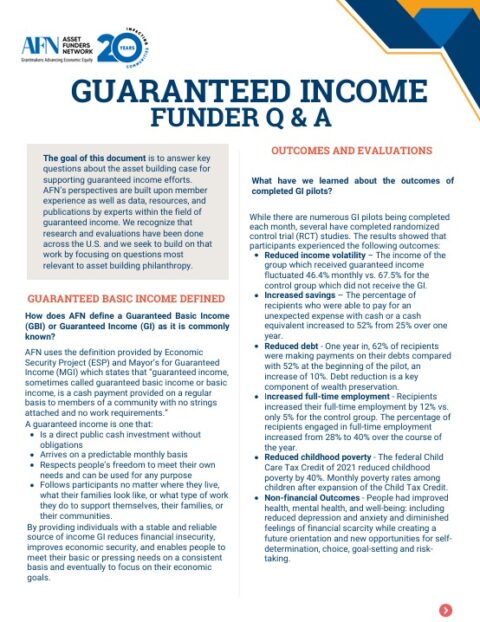 FROM THE CEO & PRESIDENT
FROM THE CEO & PRESIDENT
MARCH 2021
Last week in condemning the murders in Atlanta of 8 persons, 6 of whom were Asian American-Pacific Islanders (AAPI), AFN took a stand in solidarity with AAPI communities and recognized that:
AFN cannot realize our mission to equitably build wealth and increase economic mobility if we do not achieve the promise of equitable prosperity. Thus, we will continue to stand up and speak out together against hate and work both to end the violence and to intentionally focus our actions to reimagine our nation and its discrimination in all forms.
The mythology of the American dream has for too long offered the promise of success, but it was undercut for women and people of color with a great many pseudo-scientific, religious, and power justifications to deny equity. Through a series of policies, practices, ignorance, and biased socialization our nation created systems that upheld and still sustain the racial superiority of whites as the norm. I am reminded that the sociologist Robin DiAngelo describes the dominant history and narrative in America as whatever affirms whiteness as the standard and norm of cultural and economic superiority. This helped ensure the existence of massive racial and gender wealth gaps while suggesting the source of such gaps was a function of individual effort or failure. But, we know from a great many researchers and economists that this is a lie; this unsound, biased narrative needs to be disrupted and replaced. It will be hard.
Today, to reverse the wealth gaps and to create equitable economic mobility, our focus has to be nuanced to understand the various, at times unique, historical policies and practices that worked against Black, Latinx, Indigenous, and Asian-American/Pacific Islander populations and relentless in challenging the systemic assumptions that preserve the old norms. At AFN we are moving to engage ideas and foster action that are expressly anti-racist. Reimagining systems and opportunities include actively redressing past wrongs through payment of targeted damages, creating equitable opportunities like Baby Bonds, and dismantling crippling systemic wealth stripping that keeps down the people working hard across sectors and communities.
This week, it was energizing to learn the Illinois legislature did some hard work and passed the Illinois Predatory Loan Prevention Act limiting payday loans and title loans to 36% instead of the 297%. They did this in part by philanthropy funded advocates showing that the limit will help grow the economy and jobs. Also passed was an Illinois Community Reinvestment Act, to augment the federal CRA, by providing oversight for state regulated financial institutions. As a result, state chartered banks, savings banks, credit unions and larger residential mortgage brokers, will receive oversight to ensure they improve access to credit for communities of color.
And there was more. The City Council of Evanston, the 14th largest city in Illinois, created a fund for reparations from cannabis revenues and passed the Restorative Housing Program to compensate Black residents of Evanston subjected to discriminatory redlining and relocation between 1919 and 1969. They, their children, grandchildren, great-grandchildren or other direct descendants can qualify for $25,000 for down payment/closing cost assistance to purchase real property, for repairs or improvements to real property, or to pay down mortgage principal, interest, and/or late penalties for real property located within the city limits. This year’s appropriation is $400,000.
These Illinois examples offer tangible movement in the right direction of equitable system change to end wealth stripping and repair past damages.
Wealth stripping has many systemic drivers that need correction. One daunting system to reform is related to medical debt. Our most recent brief on Medical Debt and related webinar explore with an expert panel the aggressive, often abusive, collection practices that undermine economic security resulting in income stripping, damage credit scores out of proportion to the debt, and prevent wealth building. Indeed, 79 million Americans or 24% of the population struggle to pay medical debt, and in 100 counties in this country nearly 35% of the community struggles under medical debt in collections! This debt disproportionately impacts people of color, especially Blacks, due to various systemic policies. In both our national webinar and in a deeper dive on Debt in Texas with Federal Reserve Bank of Dallas, AFN explores how the existing system of medical debt harms health outcomes and the local legal system has been hijacked to become a collection vehicle and not one of justice. Systemic fixes are overdue.
The experts in philanthropy and in these systems understand what needs to be disrupted and reimagined to achieve equity and better heath-wealth outcomes. Without these systemic reforms, the burden will continue to be placed on low and middle wealth households that are disproportionately people of color and women and crush the goals of equitable wealth building. AFN and philanthropy have the tools and wherewithal to advocate and create the environment for these changes in the near future.
The work is hard. But, together, through philanthropic vision, voice, and investments, change is achievable.
Join the conversation at AFN and build upon the effort to create a more equitable wealth building and economic mobility for all.


